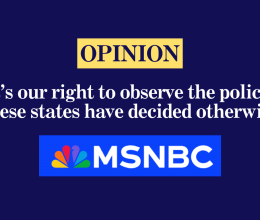By Brian Tashman, Political Researcher and Strategist, American Civil Liberties Union
While the Constitution protects the rights of students at school, many school officials are unaware of students’ legal protections, or simply ignore them.When heading back to school this year, make sure to know your rights and ensure that your school treats every student fairly and equally. The ACLU has a long tradition of fighting to protect students’ rights, and is always ready to speak with you on a confidential basis. If you believe that your rights have been violated, don’t hesitate to contact your local ACLU affiliate.
Here are six things you need to know about your rights at school:
1. Speech rights
In the landmark Supreme Court case Tinker v. Des Moines Independent Community School District (1969), the ACLU successfully challenged a school district’s decision to suspend three students for wearing armbands in protest of the Vietnam War. The court declared that students and teachers do not “shed their constitutional rights to freedom of speech or expression at the schoolhouse gate.”
The First Amendment ensures that students cannot be punished for exercising free speech rights, even if school administrators don’t approve of what they are saying. Unfortunately, where legal protections are weak, schools are threatening student’s speech – and their privacy – by requiring them to reveal the contents of their social media accounts, cell phones, laptops, and other personal technologies. The ACLU is fighting for new state laws around the country that would provide stronger student privacy protections.
Over the years, the ACLU has successfully defended the right of students to wear an anti-abortion armband, a pro-LGBT t-shirt, and shirts critical of political figures. The ACLU has even defended the rights of high school students who wanted to protest the ACLU.
Contact the ACLU if you believe your school is trying to limit your First Amendment rights.
2. Dress codes
While schools are allowed to establish dress codes, students have a right to express themselves.
Dress codes are all too often used to target and shame girls, force students to conform to gender stereotypes and punish students who wear political and countercultural messages. Such policies can be used as cover for racial discrimination, by targeting students of color over supposed “gang” symbols or punishing students for wearing natural hairstyles and hair extensions. Dress codes can also infringe on a student’s religious rights by barring rosaries, headscarves and other religious symbols.
Schools must make the case that a certain kind of dress is disruptive to school activities. They cannot use dress codes to punish girls, people of color, transgender and gender non-conforming students and free speech.
If you are told to comply with a dress code that you believe is discriminatory, contact the ACLU. Complying with the dress code will not prevent you from challenging it at a later date.
3. Immigrant rights
Schools cannot discriminate against students on the basis of race, color, national origin. Undocumented children cannot be denied their right to a free public education, but some schools continue to create exclusionary policies. Last year, the ACLU sued several school districts for requiring families to prove their immigration status in order to enroll their children in school.
Students with limited English proficiency cannot be turned away by schools, which must provide them with language instruction.
Contact the ACLU’s Immigrants’ Rights Project if you have observed or experienced discrimination based on immigration status or national origin in school.
4. Disability rights
Public schools are prohibited by federal law from discriminating against people with disabilities, and cannot deny them equal access to academic courses, field trips, extracurricular activities, school technology, and health services.
Sometimes, educators and administrators discriminate by refusing to make necessary medical accommodations, restricting access to educational activities and opportunities, ignoring harassment and bullying, and failing to train staff on compliance with state and federal laws.
Schools have a duty to defend students with disabilities from bullying and biased treatment, and the ACLU is working to ensure that the rights of these students are protected.
5. LGBT rights
Bullying of LGBT students can be pervasive at schools, and is all too often ignored or encouraged by the schools themselves. LGBT students have a right to be who they are and express themselves at school. Students have a right to be out of the closet at school, and schools cannot skirt their responsibility to create a safe learning environment and address incidents of harassment.
Public schools are not allowed to threaten to “out” students to their families, overlook bullying, force students to wear clothing inconsistent with their gender identity or bar LGBT-themed clubs or attire. Transgender and gender non-conforming students often face hostile environments in which school officials refuse to refer to students by their preferred gender pronouns or provide access to appropriate bathroom and locker room facilities.
If you find that your school is undermining your rights, contact your local ACLU affiliate or the ACLU LGBT Project. Be sure to report incidents of bullying or bias to a school principal or counselor and remember to keep detailed notes of your interactions with officials and make copies of any paperwork that the school asks you to fill out.
6. Pregnancy discrimination
Since Title IX, the federal law barring sex discrimination in education, was passed in 1972, schools have been prohibited from excluding pregnant students and students with children. Yet schools often push such students to drop out by making it impossible to complete classwork, preventing them from participating in extracurricular activities, refusing to accommodate schedule adjustments, punishing them with unwarranted disciplinary actions, and pressuring them to transfer or quit school altogether.
Denying these students an education, access to school activities and reasonable accommodations violates their rights. Public schools must ensure that pregnant students have access to the same accommodations that students with temporary medical conditions are given, including the ability to make up missed classwork and learn in a safe, nonjudgmental environment. Schools are also not allowed to punish students who choose to terminate a pregnancy or reveal a student’s private medical information.
If you believe that your school is treating you unfairly for being pregnant, ending a pregnancy, or having a child, contact the ACLU’s Women’s Rights Project.








